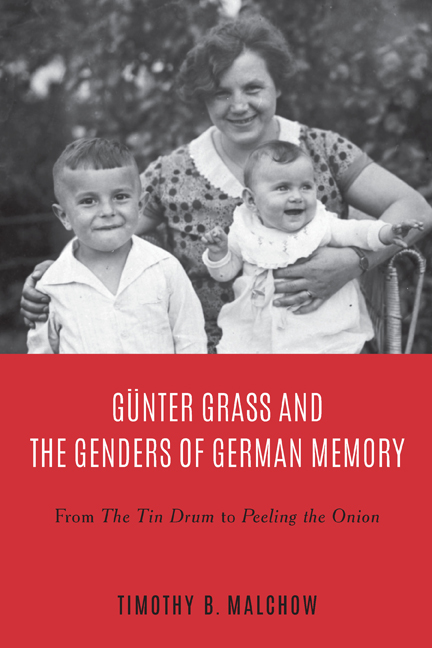Book contents
- Frontmatter
- Dedication
- Contents
- Acknowledgments
- Abbreviations, Translations, and Transcriptions
- Introduction
- 1 Grass’s Biography in Context: 1927–1959
- 2 Corporeal Memory, Trauma, and Art in The Tin Drum
- 3 Bildung, Heimat, and Gendered Modes of German Memory in The Tin Drum
- 4 A Patriarchal Arbiter of German Cultural Memory and His Feminized Others: Leveling Bildung, Opening Heimat, and Championing Art from the 1960s to the New Millennium
- 5 Grass’s Early Life Once Again: Broken Silence, Mourning, and Gendered Approaches to Memory in Peeling the Onion
- Epilogue
- Works Cited
- Index
1 - Grass’s Biography in Context: 1927–1959
Published online by Cambridge University Press: 09 February 2021
- Frontmatter
- Dedication
- Contents
- Acknowledgments
- Abbreviations, Translations, and Transcriptions
- Introduction
- 1 Grass’s Biography in Context: 1927–1959
- 2 Corporeal Memory, Trauma, and Art in The Tin Drum
- 3 Bildung, Heimat, and Gendered Modes of German Memory in The Tin Drum
- 4 A Patriarchal Arbiter of German Cultural Memory and His Feminized Others: Leveling Bildung, Opening Heimat, and Championing Art from the 1960s to the New Millennium
- 5 Grass’s Early Life Once Again: Broken Silence, Mourning, and Gendered Approaches to Memory in Peeling the Onion
- Epilogue
- Works Cited
- Index
Summary
GÜNTER GRASS's 2006 MEMOIR, Peeling the Onion, explores the limits of memory and art. It complicates the processes of remembering and telling about memories. However, it would be simplistic to conclude that the author hides behind this questioning of narrated memories in order to obscure his own past, as some critics have suggested. Among the passages calling memory into question, Grass discusses many of his activities during his first thirty-two years. Besides the Waffen-SS revelation, the account confirms and corrects details Grass's biographers uncovered about his early life and fills in some gaps. It also presents situations and settings that found their way into The Tin Drum in an altered form.
In this chapter I contextualize what Grass relates in the memoir by drawing on historical studies and other biographies. My underlying assumption is that the memoir alludes to a broader network of narratives, as all texts do. My objective here is twofold. First, I want to present the basic facts of Grass's early life in their historical and cultural-political context. Second, I aim to illuminate what the memoir actually reveals about Grass's biography, both through its reported details about his life and in its allusions to the broader historical and cultural developments that are part of cultural memory.
Grass's Early Life and Danzig
Grass was born on October 16, 1927, in Langfuhr, a suburb of Danzig (contemporary Gdańsk in Poland). A port city where the Vistula River meets the Baltic coast, Danzig connected the inland regions with the outside world and had long been essential to trade. In fact, the port's importance led to Danzig's unusual Free City status after German defeat in World War I. The 1919 Treaty of Versailles created a new Polish nationstate, giving Poland much of what had been the eastern part of Germany during the prior century. There had been no independent Poland since its partition in the last decade of the eighteenth century by the Russians, Prussians, and Austrians. After Napoleon's defeat in 1815, Danzig itself had come under Prussian control and had so become part of Germany during national unification in 1871. In 1919 the new Poland included the so-called Polish Corridor, just west of Danzig. This piece of land gave Poland direct access to the Baltic Sea. It extended south and widened for 230 kilometers, spanning over 200 kilometers across at its southern end (Tighe 90).
- Type
- Chapter
- Information
- Günter Grass and the Genders of German MemoryFrom The Tin Drum to Peeling the Onion and Beyond, pp. 37 - 67Publisher: Boydell & BrewerPrint publication year: 2021

